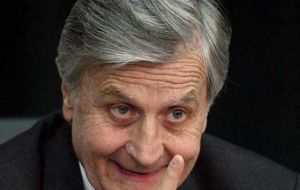MercoPress. South Atlantic News Agency
Euro central bank expected to increase interest rates next month
 Inflation has become a main concern for Jean Claude Trichet
Inflation has become a main concern for Jean Claude Trichet The European Central Bank (ECB) has signalled that it will raise interest rates next month, from 1.25%. Earlier on Thursday, the ECB kept rates unchanged for the second month in a row, after increasing them in April for the first time in almost two years.
The central bank wants to raise rates again in July to curb inflation in some of the Euro-zone's 17 member states. But it has to balance that against the need to leave rates low to boost growth in nations such as Greece and Portugal.
In his press conference, ECB president Jean-Claude Trichet pledged to exert “strong vigilance” on inflation, a signal to the markets that rates will be raised at the next meeting.
“I would say... that it means that we are in a mode where there might be in the next meeting an increase of rates,” he said. “But we are never pre-committed,” he added.
However, Trichet added that since the ECB May meeting there has been “continued upward pressure on overall inflation mainly owing to commodity and energy prices”.
Inflation in the Euro zone was 2.7% in May. The ECB increased its forecast on inflation for 2011 to 2.6% from its previous prediction of 2.3%. The bank also increased its economic growth forecast for 2011 to 1.9% from 1.7%.
“The most recent data confirm the positive underlying momentum of economic activity in the euro area,” Mr Trichet said.
The Euro zone economy remains fragile with some countries grappling with high unemployment, huge debts and government spending cuts.
In May, the European Union approved a 78bn Euro bail-out for Portugal, which comes after the Irish Republic and Greece also had to be bailed out.
“If we are right in expecting growth to slow further in the coming months, both in the periphery and the core, then a July move may prove to be the last,” said Jonathan Loynes, chief European economist at Capital Economics.
Markets have remained weak over fears that Greece's debts will still have to be restructured, a measure that the central bank opposes. Forcing Greek investors to take losses on their debt would be considered a credit default by ratings agencies, meaning the ECB could not accept Greek bonds as collateral.
Mr Trichet reiterated that he opposed any restructuring of Greek debt that were not purely voluntary and created a “credit event”.
“We are not in favour of restructuring,” Mr Trichet said. “We exclude all concepts which would not be purely voluntary, without any elements of compulsion.”
The ECB governing council also approved the leading candidate to succeed Trichet as head of the ECB. The central bank said it had “no objections” to the candidacy of Mario Draghi, the head of the Bank of Italy.
Mr Draghi is a “person of recognised standing and professional experience in monetary or banking matters,” the governing council said in a statement. He is the only declared candidate to succeed Mr Trichet, whose term ends in October. (BBC).-




Top Comments
Disclaimer & comment rulesCommenting for this story is now closed.
If you have a Facebook account, become a fan and comment on our Facebook Page!